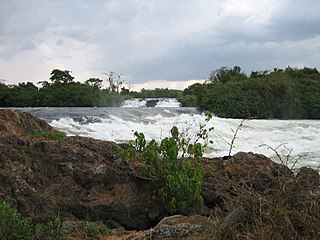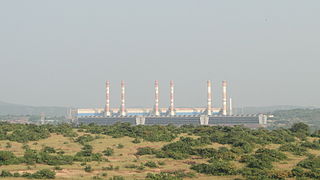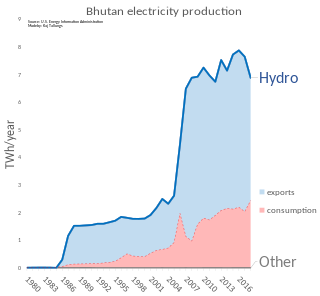
Enron Corporation was an American energy, commodities, and services company based in Houston, Texas. It was founded by Kenneth Lay in 1985 as a merger between Lay's Houston Natural Gas and InterNorth, both relatively small regional companies. Before its bankruptcy on December 2, 2001, Enron employed approximately 20,600 staff and was a major electricity, natural gas, communications, and pulp and paper company, with claimed revenues of nearly $101 billion during 2000. Fortune named Enron "America's Most Innovative Company" for six consecutive years.

The International Energy Agency (IEA) is a Paris-based autonomous intergovernmental organisation, established in 1974, that provides policy recommendations, analysis and data on the global energy sector. The 31 member countries and 13 association countries of the IEA represent 75% of global energy demand.
The Dabhol Power Company was a company based in Maharashtra, India, formed in 1992 to manage and operate the controversial Dabhol Power Plant. The Dabhol plant was built through the combined effort of Enron as the majority share holder, and GE, and Bechtel as minority share holders. GE provided the generating turbines to Dabhol, Bechtel constructed the physical plant, and Enron was charged with managing the project through Enron International. From 1992 to 2001, the construction and operation of the plant was mired in controversies related to corruption in Enron and at the highest political levels in India and the United States. The price that the state electricity board would have to pay for electricity produced by DPC was more than 20 times what it paid for hydroelectricity.

Sucheta Dalal is an Indian business journalist and author. She has been a journalist for over two decades and was awarded a Padma Shri for journalism in 2006. She was the Financial Editor for the Times of India until 1998 when she joined the Indian Express group as a Consulting Editor, leaving in 2008. She is known for exposing the 1992 stock market scam propagated by Harshad Mehta.

India's solar power installed capacity was 90.76 GW AC as of 30 September 2024. India is the third largest producer of solar power globally.
For solar power, South Asia has the ideal combination of both high solar insolation and a high density of potential customers.

China is the world's leader in electricity production from renewable energy sources, with over triple the generation of the second-ranking country, the United States. China's renewable energy sector is growing faster than its fossil fuels and nuclear power capacity, and is expected to contribute 43% of global renewable capacity growth. China's total renewable energy capacity exceeded 1,000 GW in 2021, accounting for 43.5 per cent of the country's total power generation capacity, 10.2 percentage points higher than in 2015. The country aims to have 80 per cent of its total energy mix come from non-fossil fuel sources by 2060, and achieve a combined 1,200 GW of solar and wind capacity by 2030. In 2023, it was reported that China was on track to reach 1,371 gigawatts of wind and solar by 2025, five years ahead of target due to new renewables installations breaking records. In 2024, it was reported that China would reach its target by the end of July 2024, six years ahead of target.

The Bujagali Power Station is a hydroelectric power station across the Victoria Nile that harnesses the energy of its namesake, the Bujagali Falls, in Uganda. Construction began in 2007 and concluded in 2012. It was officially inaugurated on 8 October 2012 by Ugandan President Yoweri Museveni and Aga Khan IV in the presence of African politicians and investors.

K. Radhakrishnan a.k.a Koppillil Radhakrishnan is an Indian space scientist who headed the Indian Space Research Organisation (ISRO) as Chairman of Space Commission, Secretary of the Department of Space, Government of India. Under his leadership, India became the first country to reach Mars in its first attempt.

Dabhol Power Station is located near Anjanwel village in Ratnagiri district in Maharashtra, India, about 160 kilometres (99 mi) south of Mumbai. The power station was built by the Dabhol Power Company (DPC), which was a joint venture of Enron International, General Electric, Bechtel and Maharashtra Power Development Corporation. At the start of its construction in 1992, the Dabhol power station project was, at $3 billion, the biggest foreign investment in India. The project was mired in controversy from its inception, which would escalate so dramatically that it affected politics and foreign policy at the national level.

Ratnagiri Gas and Power Private Limited (RGPPL) is a Subsidiary of NTPC Limited. The company was established to take over and revive the assets of the defunct Dabhol Power Company. RGPPL owns one of India's largest and only LNG based power plants and the LNG regasification terminal at Dabhol.

Energy in Bhutan has been a primary focus of development in the kingdom under its Five-Year Plans. In cooperation with India, Bhutan has undertaken several hydroelectric projects whose output is traded between the countries. Though Bhutan's many hydroelectric plants provide energy far in excess of its needs in the summer, dry winters and increased fuel demand makes the kingdom a marginal net importer of energy from India.

The Ministry of Energy of the Kingdom of Thailand is a cabinet ministry in the Government of Thailand. Its budget for fiscal year 2019 is 2,319 million baht.

Central Training Institute, popularly known as CTI Jabalpur, is located in Nayagaon, Jabalpur, Madhya Pradesh, India. It is an apex engineering and civil service training institute of the Madhya Pradesh Poorv Kshetra Vidyut Vitaran Company Ltd (MPPKVVCL), wholly owned by the Government of Madhya Pradesh. The institute provides technical and managerial training to assistant engineers, junior engineers, accounts officers, HR managers, office assistants, line men, and testing assistants.
Bangladesh suffers with heavy energy crisis with the gradual expansion of economic activities of the country. The estimations and reserves of energy resources show future potentials but a small fraction of them are being utilized which proved to be insufficient. Moreover, the impact of climate change and environment pollution has also been significantly felt. As a result, the successive governments have aimed at formulating an effective energy policy which would address these concerns. The energy policies have also received extensive criticisms especially on the questions of energy export and methods of extraction.

Ambuj D. Sagar is the Vipula and Mahesh Chaturvedi Professor of Policy Studies at the Indian Institute of Technology Delhi. As of October 2022, he has been appointed as the deputy director at IIT Delhi. His interests broadly lie in science and technology policy, environmental policy, and development policy, with a particular focus on the interactions between technology and society. While his current research focuses mainly on energy innovation and climate policy, he also studies, more broadly, various facets of technology innovation, environmental policy politics and processes, and engineering education and research.
Thiruvengadam Lakshman Sankar (1928-2018) is from India—an energy expert, civil servant, corporate executive and the former head of Asian Energy Survey of the Asian Development Bank. He also worked as a former chairman of the Andhra Pradesh Gas Power Corporation Limited and Transmission Corporation of Andhra Pradesh. Securing his MSc degree in physical chemistry from the University of Madras and MA degree in development economics from Wilson College, he entered the Indian Administrative Service where he held positions such as the Secretary of the Fuel Policy Committee from 1970 to 1975 and the Principal Secretary of the Working Group on Energy Policy from 1978 to 1979. In 2007, he headed a government committee, popularly known as the T. L. Shankar Committee, which proposed ways to reform the Indian coal sector. He is a non-executive chairman of KSK Energy Ventures and a United Nations adviser on Energy to the governments of Sri Lanka, Tanzania, Jamaica, North Korea and Bangladesh. He is a former board member of Hindustan Petroleum Corporation and a former member of the Integrated Energy Policy Committee of the Planning Commission of India. The Government of India awarded him the third highest civilian honour of the Padma Bhushanin 2004, for his significant contributions to society. He died on 26.12.2018—a tragic day for his family, colleagues and the people who benefitted from his work all these years. He had three sons - Ravi, Sachin and Nitin Sanker.

Prayas (Energy Group) is an Indian research and analysis organisation working in the area of energy policy. It is part of a non-governmental charitable trust called Prayas (long name is Initiatives in Health, Energy and Parenthood) located in Pune, India. The aim of Prayas is to make energy a tool for sustainable and equitable development for all citizens, by analysis, discourse building, policy and regulatory engagements and collaboration with other civil society organisations.
Navroz K Dubash is a professor at the Centre for Policy Research (CPR). He works on climate change policy and governance, the political economy of energy and water, and the regulatory state in the developing world. Widely published in these areas, Navroz serves on the Intergovernmental Panel on Climate Change as a Chapter Lead Author, Government of India advisory committees on climate change, energy and water policy, and the editorial boards of several international journals.
National Action Plan for Climate Change (NAPCC) is a Government of India's programme launched in 2008 to mitigate and adapt to the adverse impact of climate change. The action plan is designed and published under the guidance of Prime Minister’s Council on Climate Change (PMCCC). The 8 sub-missions aimed at fulfilling India's developmental objectives with focus on reducing emission intensity of its economy. The plan will rely on the support from the developed countries with the prime focus of keeping its carbon emissions below the developed economies at any point of time. The 8 missions under NAPCC are as follows:















